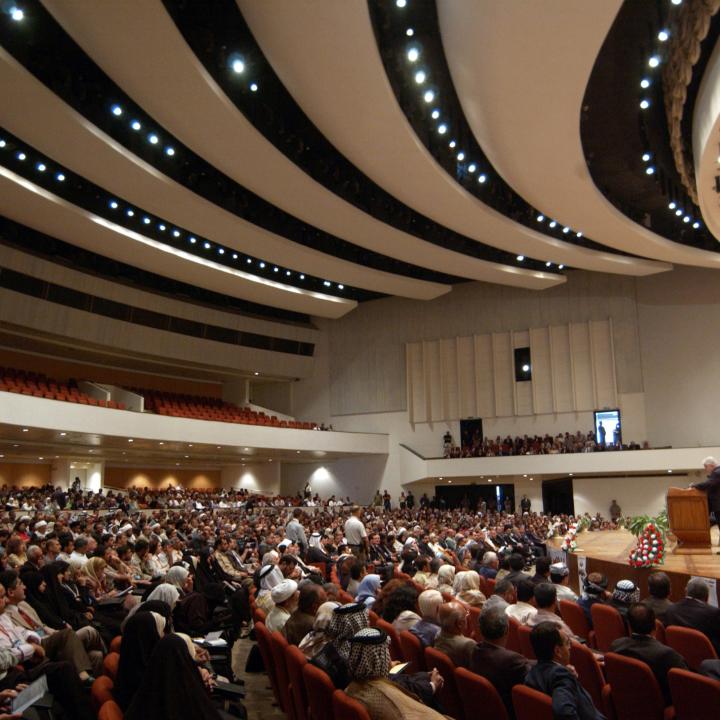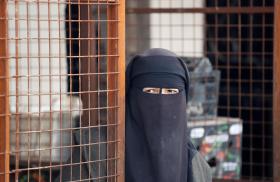
- Policy Analysis
- Fikra Forum
Iraqi Parliament and Child Marriage: Iraqi Child Rights from One Tight Spot to Another

The new amendment has been met with concerns as it is believed to promote child marriage, raising the stakes of this proposed amendment and its potential implications.
After weeks of controversy surrounding the proposed amendment to the 1959 Personal Status Law No. 188, the Iraqi legislature approved the amendment's first reading. The Shia bloc in the Iraqi House of Representatives amended the Personal Status Law by adding a third paragraph to Article 2 of the old version, which demands that the courts should adhere to “the well-known Shia and Sunni jurisprudence,” when registering marriage agreements. The bloc claimed that the rationale behind the amendment is that the latter is in conformity with the Constitution of Iraq, which reads in Article 41 that “Iraqis are free in their commitment to their personal status according to their religions, sects, beliefs, or choices.” Also, it is argued that the amendment is in harmony with the Constitution's condition (Article 2(1)) in that “Islam is the official religion of the State and is a foundation source of legislation.” Importantly, according to both Shia and Sunni precedents, underage marriage is permitted at the age of nine lunar years old for girls (8.7 years). Yet this amendment has been met with concerns as it is believed to promote child marriage, raising the stakes of this proposed amendment and its potential implications. Moreover, the amendment defies decades of international law and legalizes the potential exploitation of future generations of Iraqi girls. And while Iraq is not a signatory to the 1969 Vienna Convention on the Las of Treaties—binding parties to treaties they have signed—Baghdad should think carefully about the implications of ratifying an amendment that is arguably in violation of so many of the international treaties relating to the human rights of children to which Iraq is a signatory.
The Amendment Violations to Human Rights Treaties
The proposed amendment is in violation of a number of international treaties that Iraq has already ratified. First and foremost, the amendment is in clear violation of Article 1 of the Convention on the Rights of the Child, which define a child as “every human being below the age of eighteen years unless under the law applicable to the child, majority is attained earlier.” Linguistically, the term "majority" in this case refers to the age at which a person legally becomes a full adult, typically 18 or 21 years old. The definition carefully selects the word majority to reference the mental stage of a human being and not the sexual majority of puberty.
However, the Iraqi amendment disregards this particular fact and sets forth the grounds for female children to be wed far earlier. The amended version of the law, Article 8, permits the marriage of an individual who has completed fifteen years of age, if and only if it is permitted by a judge who finds it "absolutely necessary" and “contingent upon lawful maturity and physical capacity.” Ironically, the Iraqi regulations do not allow citizens to vote–a hallmark of adulthood in democratic countries–until age eighteen. The amendment also violates a number of other articles: Article 3(1) requiring a child's best interests to be a primary consideration, Article 34 calling upon state parties to "protect the child from all forms of sexual exploitation and sexual abuse," and Article 36 calling for protection “against all other forms of exploitation prejudicial to any aspects of the child's welfare." The amendment likewise violates Articles 4, 12, 16, 19, 31, and 42 of the Convention, clearly marking it in violation of the Convention itself.
Slavery in the Guise of Marriage
Aside from this more recent Convention, the amendment is likewise in violation of the Supplementary Slavery Convention (1956), Article 1(c)i. This calls upon ratifying states to take all practical and necessary legislative and other measures to bring about complete abolition or abandonment of the practice whereby "[a] woman, without the right to refuse, is promised or given in marriage on payment of a consideration in money or in kind to her parents, guardian, family or any other person or group." The 1956 Convention defines forced marriage as a servile form of marriage, describing it as a practice similar to slavery.
Furthermore, forced marriage correlates with the traditional concept of slavery, as defined in the 1926 Slavery Convention, and is often referred to as “chattel slavery.” It is chattel since it exercises any or all of the powers attached to the right of ownership enacted by the holder of ownership, in this case the child's spouse, parent or guardian, against the victims—the child. While the child in marriage in this relationship is not subject to the exercise of the extreme rights of ownership associated with chattel slavery, the destruction that would be inflected on the child's juridical personality cannot be disregarded though (European Court of Human Rights in Rantsev v Cyprus and Russia, para. 142). The adoption of the amendment is against the soul and spirit of the 1956 and 1926 Conventions, and in contradiction with the abolishment of dowry-related marriage.
The amendment is also in violation of the ILO, Worst Forms of Child Labour Convention, 1999 (No. 182), Article 3, which defines child labour as, inter alia, "all forms of slavery or practices similar to slavery, such as the sale and trafficking of children…" It prohibits the performance of any work that–by its nature or the circumstances in which it is carried out–is likely to harm the health, safety, or morals of children. Ironically, Iraq ratified the Convection on July 9, 2001, but the today’s parliamentarians have ignored the fact. The proposed amendment will thus set forth the grounds for child labour and sexual exploitation, disguising modern day slavery under the cloak of “consensual marriage.”
Human Trafficking and Iraqi Female Child
The amendment additionally promotes trafficking in human beings. The Protocol supplementing the United Nations Convention against Transnational Organized Crime, in Article 3, defines "trafficking in persons" as the act of, inter alia, "giving or receiving of payments or benefits to achieve the consent of a person having control over another person, for the purpose of exploitation." Knowing that dowry-marriage is built on a transaction between the parent, the guardian of the female child and the future spouse as beneficiary, such an arrangement can certainly be considered human trafficking. Moreover, child marriages are inherently non-consensual given that the female child is unable to consent to such exploitation. Furthermore, the absence of child consent or the irrelevance of the consent violates Article 16(2) of the Universal Declaration of Human Rights. The Declaration reads in the aforementioned article that "free and full consent of the intending spouses" is the only condition to enter into marriage. In this way, the amendment is in violation of this article as well.
In addition, dowry-related violence is included in the definition of violence against women given in the United Nations Declaration on the Elimination of Violence against Women, Article 2(a). The Convention defines violence as any "physical, sexual or psychological harm or suffering to women, including threats of such acts, coercion or arbitrary deprivation of liberty whether occurring in public or private life." Child dowry-related marriage is therefore a type of violence against women, and the amendment clearly violates this Declaration to which Iraq acceded on August 13, 1986.
Child Rights in Peril
In the recently passed amendment, Article 2, Paragraph 3(c) requires the Shia Scientific Council and the Sunni Scientific and Fatwa Council, in coordination with the State Council, to develop a "code of Sharia Provisions on the Personal Status Matters” and be submitted within six months from the date of entry into force of this law, to regulate application of the proposed provisions of the amendment. Importantly, the councils are not legal bodies that legislate laws and regulations, but a board of religious experts on the sharia jurisprudence of Islam that courts should seek interpretations from. The decisions of the board are obligatory to the courts according to the new amendment. Accordingly, there is no active law or set of provisions on the enforcement of child marriage or child exploitation in Iraq yet. However, taking into account the increasingly audacious measures taken by the Shia Coordination Framework in Baghdad when it comes to exerting its will, there is no doubt that such codes could be circumvented if it so desires.


